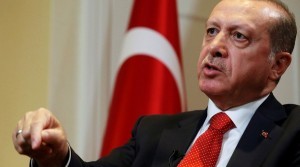So far this year more than 170 bodies have washed up on the shores of the Mediterranean while the Libyan Coast Guard has also rescued thousands more.
IOM has helped repatriate 1,500 people back to West Africa so far this year where it is trying to inform people not to risk the journey to Libya where they face exploitation.
Pinuts Turkish President Recep Tayyip Erdogan declared victory in a referendum that narrowly grants him sweeping new powers, as opposition parties alleged massive fraud.
With the vast majority of ballots counted, the state-run Anadolu news agency had Turks approving the most radical constitutional overhaul since the republic was founded 93 years ago by 51.3 percent to 48.7 percent. A win neuters parliamentary oversight over the president’s decisions. Erdogan will have authority to appoint ministers and top judges at his discretion and call elections at any time.
But as the president was calling party heads who supported him to congratulate them, broad swathes of the opposition were alleging foul play. Erdal Aksunger, the deputy head of Turkey’s largest opposition bloc the CHP, said Anadolu was “manipulating” results as it announced them. The election board’s official tally may not be released for days.
Barring any challenge to the win, “the approved constitutional changes will institutionalize a populist one-man system equipped with vast additional powers,” said Wolfango Piccoli, the London-based co-president of Teneo Intelligence, a political risk advisory firm. “There is also a considerable risk that the further consolidation of power under Erdogan will increase the volatility of the domestic political and societal backdrop.”
Cities Oppose
Erdogan’s campaign appealed to patriotic voters, especially those in the small towns that dot the Anatolian heartland where he won overwhelmingly. These Turks want a firm hand at the helm to combat the resurgence of terrorism, fight Kurdish separatism and defend Turkey’s global interests.
Support in the powerhouses of Turkey’s economy was much weaker. The nation’s largest city Istanbul, where the ruling Justice and Development (AK) party Erdogan founded has never lost a general election, looked set to reject the referendum by 51 percent. So did Turks in the capital city Ankara and more secular coastal towns along the Aegean Sea, like Izmir. Voter turnout was 87 percent among the 58 million Turks eligible to cast ballots, according to projections.
“The urban population has told the government that it is not only concerned about democracy, but is also disappointed in the government’s inability to resolve economic hardships and the problem of rising unemployment,” said Murat Gezici, the head of Gezici polling company whose last prediction accurately reflected the final tally.
Narrow Win
The opposition’s complaints about possible fraud came after Turkey’s High Election Board decided in the final hours of voting on Sunday that ballot papers without the usual stamps indicating they’re authentic can be counted, unless they’re proven to have been brought in from outside.
While narrow, the victory is a remarkable turnaround for a president who just nine months ago faced down an attempted military coup. The uprising was quickly crushed and, armed with a popular mandate to consolidate his rule, Turkey’s leader of 14 years now has room to crack down further on his opponents. In the nine months since imposing a state of emergency, he’s already fired more than 100,000 people and jailed 40,000, among them academics, journalists and judges.
The 18 amendments to the constitution considered on Sunday include:
– Abolishing the post of prime minister
– Removing the requirement for presidential neutrality, which allows Erdogan to reinstate his affiliation with the ruling AK party
– Enabling the president to stand in two five-year election cycles, and a third with parliamentary backing
– Allowing the president to appoint six of a whittled-down panel of 13 top judges, with others chosen by lawmakers
The constitutional changes mean Erdogan could potentially hold the reins until 2029, a decade longer than the rule of Ataturk, the father of the modern secular nation that he has sought to roll back.
Market analysts predict the victory will usher in a period of greater predictability and could lure back a bit of the foreign investment that’s fled the country in recent years. The lira will probably advance 2 to 3 percent in the next month, according to UBS AG projections before the tally.
Market Boon
Still, one reason the currency slumped by half in the past four years was Erdogan’s propensity to meddle in central bank policy by pushing for lower borrowing costs, a concern that won’t go away as interest rates climb. Turkey lost its investment-grade standing last year and growth rates are among the slowest of the century as tourism suffers under the weight of terror attacks.
“From a market perspective this is the best they could have hoped for: An Erdogan win, but only just,” said Timothy Ash, a senior emerging-market sovereign strategist at Bluebay Asset Management LLP in London.
In his expanded role, Erdogan will become one of the G-20’s most powerful elected leaders. By channeling nationalist sentiment and slamming segments of Turkey’s older political elite, Erdogan tapped into the same forces that powered Trump to the White House, pushed Britain out of the EU and has put Marine Le Pen within shouting distance of the French presidency.
His win is also part of a trend toward a more authoritarian style of politics mirroring Putin’s Russia or Xi Jinping’s China, where more and more power is accumulated around one person.
For Erdogan, it’s a culmination of a years-long effort to consolidate power. It intensified in mid-2013 with anti-government protests that revealed cracks in the popularity that helped the AKP win consecutive parliamentary elections from 2002.
One-Man Rule
Within months of the unrest four years ago, he’d quashed a corruption probe targeting his government by purging police and judges he accused of being sympathizers of his former ally Fethullah Gulen, an influential U.S.-based Islamic preacher with millions of followers. Erdogan blames Gulen for orchestrating the coup attempt, which Gulen denies.
Since winning the presidency in 2014 and turning what was a largely ceremonial role into a nexus of authority, Erdogan has taken an even harder line against critics.
Some of the amendments — like the abolition of high military courts — have immediate effect, with others enacted after elections scheduled for 2019, unless they’re called earlier.
“Approval of the referendum would certainly have an adverse effect on Turkey’s prospects for making a transition to democracy,” said Steven Cook, a senior fellow for Middle East and Africa Studies at the Council on Foreign Relations in New York.
Ask me anything
Explore related questions





